- Home
- Debra Holland
Montana Sky Christmas: A Sweetwater Springs Short Story Collection
Montana Sky Christmas: A Sweetwater Springs Short Story Collection Read online
MONTANA SKY CHRISTMAS
By Debra Holland
Copyright © 2012 by Debra Holland
Kindle Edition
All other rights reserved by the author. The reproduction or other use of any part of this publication without the prior written consent of the rights holder is an infringement of the copyright law.
AUTHOR’S NOTE
Welcome to Sweetwater Springs, a small town in Western Montana. This collection of seven short stories takes place after Stormy Montana Sky, the third book in the Montana Sky series. But this volume can also be read as a stand-alone book.
These stories are about various kinds of Christmas love—the romance between a man and a woman, the devotion of a husband to his wife’s memory, or the love of a child for her goose. You’ll read about familiar characters and come to know new ones—many whom you’ll see again in future Montana Sky books and novellas.
Regardless of when you read these stories, I wish you happy holidays throughout the year.
—Debra Holland
RED STOCKINGS FOR CHRISTMAS
As the campfire radiated warmth in the opening of the lean-to, Red Macalister crouched before the burning logs. He added more wood to the blaze, then rocked back on his boot heels, studying the flames, and decided the fire would do for the next few hours to ward off the cold winter night. He glanced up at the black sky dotted with diamonds. A clear night. Tomorrow, they’d be able to herd the straggling cattle back to the pasture near the ranch house. He scooted backward under the lean-to of pine branches and nodded at his two companions.
Curly Joe, named for his long brown beard, not the hairless head now covered by a brown knitted cap, sat cross-legged next to him. Jed, a thin, silent man, sprawled on his bedroll at the edge of their shelter.
Curly Joe stroked his beard. “I’ll take first,” meaning he’d wake up in a few hours to feed the fire.
“Second.” Jed made the single word as terse as possible.
Red shrugged. That meant dawn and boiling water for coffee fell to him.
The men didn’t really need to spell out the order. They’d worked together for ten years, two of them at their own Circle Three Ranch. They’d fallen into a familiar routine, rotating the chores each day.
But, as they often teased Jed, if they didn’t play out their ritual each night, they might not hear a word from their quiet partner for days. They jested that his voice would dry up, and then what would happen if he needed it?
Red pulled off his boots and set them by the fire. Not too close, but near enough so the leather wouldn’t freeze his feet in the morning. He wiggled his toes, grimacing at the widening hole in one of his red stockings. If he didn’t wear another pair of brown ones underneath, his big toe would be flappin’ naked in the chill wind.
Curly Joe looked over at Red’s feet and guffawed. “That pair is plumb wore out. Might as well give ’em up.”
Red clenched his jaw, leaned over, and picked at the hole, trying to pull the edges together, to no avail. Ignoring Curly Joe, he slid underneath his bedroll. When he got back to the ranch, he’d have their housekeeper darn the hole. It didn’t matter that his stockings now had more darns than yarn on the heels. He needed his lucky stockings and wasn’t about to give them up.
~ ~ ~
Louisa Cannon walked back from the train station empty-handed. She’d prayed that there would be a letter from her brother, waiting in the mailroom at the depot. But the empty slot had dashed her dwindling hopes.
Michael must not have received my letter. She’d didn’t dare let herself think there could be a worse reason. Please, God, may he be safe.
As she walked down the frozen main street of Sweetwater Springs, the wind whipped around her, colder than when she’d set out. She passed the mercantile, decorated with a pine wreath and a big red bow, and spared a hope that the Cobbs managed to sell more of her knitted goods.
The white wooden church on her left contrasted with the saloons and the skeleton of two new buildings on the other side of the street. The sound of hammers rang out, the crew taking advantage of a clear day. Normally, she stopped to watch their progress, but today, she was so preoccupied with her worries that she almost ran into Mr. Livingston, the banker, who’d stopped to tip his hat. “Good day, Miss Cannon.”
“Mr. Livingston.” Louisa gave him a polite smile.
The thrill that usually tingled her spine at any attention from the handsome banker didn’t affect her today. She couldn’t even appreciate his polished Eastern manners, because his presence was a reminder that the rent on her little house was due him by the end of the month.
Her fingers tightened on the front of her coat. She didn’t have it, nor have any way to get the money short of… Louisa let her gaze slide toward Hardy’s Saloon and had to repress a shudder.
I’d rather die.
The banker dropped his hand to his side. “I see the Cobbs have a wreath up for Christmas.” He waved toward the store. “My sister and nephew put our tree up yesterday. How are your Christmas preparations coming, Miss Cannon?”
Just dandy.
Remorse crossed his face. “Excuse me. I’d forgotten about your mother. Christmas will be—”
“I’ll have good memories,” she interrupted, mostly to make him feel better, not because she believed her words.
He nodded and continued walking toward the mercantile.
No doubt he’s eager to buy more presents to add to the pile rumored to already reside under his Christmas tree.
For Louisa, just eking out enough heat from the stove, burning the last of the candles and a small amount of oil for the lamp, and fixing a plain meal of beans would suffice as her Christmas. After that, her nights would be dark except for the glow of the stove, and she’d have to sleep in the kitchen because there was no extra wood or coal for a fire in her bedroom.
Perhaps I can walk to the forest and bring back an armful of branches.
Her mind replayed the familiar litany, struggling to find ways to survive, before discarding each idea.
Teacher? Harriet Gordon already had that job.
Washer woman? She’d gladly take in washing but Widow Murphy at the boarding house wouldn’t appreciate Louisa encroaching on her territory. In fact, with the woman’s propensity for nasty gossip, she could make life quite difficult. More difficult, Louisa amended.
Teach music lessons? Her brother had taken his violin with him when he’d headed to California three months ago to make his fortune. How could he have been so selfish?
She pulled back her resentment. Michael couldn’t have known their mother would die suddenly. But he should have known that without his income they’d run out of money
Seamstress? Louisa glanced down at her unadorned black dress and grimaced. She could do basic sewing, but not the kind of work she’d need to set up a business. And she didn’t have a sewing machine.
Cook? Her cooking skills were not her strongest suit, but she could rustle up a basic meal.
Housekeeper? She’d made inquiries and hadn’t yet found a place.
Wife? She cringed, knowing of an open position. Donny Addison had hinted he’d be glad to marry her. He’d said he’d give her a short time of mourning for her mother, but expected her answer in the New Year. Unlike his spare parents, Donny had grown up buff and hearty. Some might call him a fine figure of a man. But he had squinty eyes, and big, meaty hands, and stood too close to her when he talked, as if he already owned her.
I’d rather die.
Louisa rolled her eyes at her own mournful thoughts. I’m not going to d
ie, and I am going to find a solution that doesn’t involve marrying Donny Addison!
She could tolerate a loveless marriage with someone she liked and respected, someone she could bear to have touch her. But no other man had expressed interest, a circumstance that puzzled and hurt her, especially since men outnumbered women in these parts, and even the homeliest women found husbands.
Quickening her steps, she turned the corner and walked the blocks to her little house, feeling her feet and hands turn to ice. Her nose must be red, matching her flannel petticoat and knitted stockings—not that anyone could see the bright attire under her proper mourning gown.
Louisa trotted into the house. Inside was almost as cold as outside, but at least the walls stopped the chill breeze. She hurried to the kitchen, where she stirred up the banked coals in the stove and added a measly stick of wood. Standing as close as she dared, she held out her fingers to the heat, meager though it was, trickling into the air.
Once her fingers had warmed, Louisa placed a pot of beans that she’d soaked overnight on the surface, pulled the rocking chair next to the stove, and picked up her knitting. The Cobbs had bought a steady stream of scarves, shawls, mittens, and stockings from her these last months. The money had sustained her while she waited for word from her brother. But a few weeks ago, the shopkeeper had told her the store was overstocked, and they wouldn’t need any more for a while.
But Louisa couldn’t sit idle, waiting for a pot of beans to boil; not while she still had yarn left. And maybe a horde of cowboys would descend on the town and wipe out the inventory at the mercantile.
Louisa peeled off her mittens and had just started the stitches on a shawl, making a fancy edging, when the idea came to her. Most women could do plain knitting, but not the more elaborate patterns Louisa had learned from her grandmother. What if I teach fancy knitting?
The idea raced around in her head. Her fingers sped up, and she rocked harder. Even if her students couldn’t afford to pay in cash, she could barter for food or firewood.
Louisa set her knitting on the table and rushed to her room. She pulled out some paper and ink and carefully penned a sign: Knitting Lessons, Inquire Within. Then she made a dozen flyers to distribute around town, describing what kind of stitches she could teach. Maybe she could even find enough courage to venture into the saloons and hand them out to the women. Many of the townsfolk would criticize her if she associated with saloon girls and prostitutes, but they weren’t on the verge of losing their homes. Or having to marry Donny Addison.
~ ~ ~
Red sat at the table in the kitchen of the Circle Three ranch house, polishing off a piece of pumpkin pie. The other two men had finished their meal and headed out.
Mrs. Dean, their housekeeper, set a pile of clean clothes on the table in front of Red. His red stockings lay on top. He picked one up, saw the gaping hole, and looked up at his housekeeper in inquiry.
The woman let out a sigh and took a seat across from him. “I’ve gotten too old, Red. Cain’t see to thread a needle. Too much rheumatism in my hands to sew and darn even if I could.”
He looked at Mrs. Dean, really seeing her for the first time in ages. The little woman had a feisty spirit that was three times as big as she was. She’d taken over the ranch house from the moment the three men had hired her. She set out bullying them into living semi-civilized—as much as three cowboys could.
But today he saw the tiredness on her bony face, and how age had thinned her white hair and faded her blue eyes. He’d known she’d struggled with swollen joints, and now he studied her hands and saw the age spots, protruding veins, and gnarled fingers.
Emotion welled up, sticking in his throat. Mrs. Dean had become a second mother to him—to the three of them. She worked hard. Harder than a woman in her sixties should. Red chastised himself for not having the sense to notice because he…they…were too darn focused on making a go of the ranch.
He wanted to commiserate with Mrs. Dean, to tell her everything would be all right. But he couldn’t force out the words. He had no magic that would take away her pain and make her younger, just like he couldn’t save his ma when she’d wasted away. And, if he told Mrs. Dean to take it easy, Red knew he’d offend her.
Instead of useless words, he leaned over and gently enveloped her tiny hand in his, brought it to his lips, and kissed the thin skin on the back, right on an age spot. “It’s all right.”
Moisture glistened in her eyes. “No it’s not. I know how important those stockings are to you.”
“Just something I wear on my feet.”
“But your mother—”
He set his other hand on the socks. “These aren’t the ones she made. Those wore out a long time ago.” A small scrap remained, and he always carried it with him in his pockets—his lucky talisman. “I’ll buy another pair.”
“Good.” She gave a decisive nod. “Good. Better buy two. Three even, since I won’t be darning them anymore.”
“Will do.” He gave her hand a gentle squeeze, then released it. Scooping up the clothes, he rose. “Thank you for doing the laundry.”
Pink rose in her cheeks, and she swatted toward him. “Get along with you. Don’t be wasting your Irish blarney on me. Better you find a nice young lady who can darn your stockings. Use your silver tongue on her.”
Red laughed. He wished he did have the famed Irish blarney his grandfather had possessed. Or so his mother had told him. He also wished he could find a woman to court. But running a ranch, with few trips to town, made wife-hunting difficult.
Mrs. Dean bustled over to the stove and pretended to be busy stirring a pot.
Red watched her for a moment, then walked to his room. One thing was sure. His housekeeper was getting old, and he’d have to find her some help. But given her pride, the shortage of womenfolk around, and their lack of money, help was going to be hard to come by.
We’ll just have to pitch in more. Curly Joe’s gonna have a fit when he hears he’ll be doing women’s work.
~ ~ ~
The next morning, Red stood in the aisle of the Cobbs’ mercantile, looking through the selection of men’s stockings. He saw black and brown and blue pairs, but no red ones. Not that he expected to find red. The mercantile had never stocked them before, and even though it was Christmas season, the Cobbs didn’t have them on hand now, either.
Red picked up a pair of brown stockings, holding the pair in his hand as if they could magically change color. Then he dropped them back on the shelf and walked away. On the verge of striding out, Red remembered Mrs. Dean had charged him with buying white sugar and flour. He grabbed a sack of each and took them to the counter to pay.
He inhaled the scent of fresh bread, wafting from the loaves on the shelves by the counter, and hunger pangs tempted him to buy one. But Mrs. Dean would scalp him if he bought something she could bake herself.
A white apron, hanging on a hook, caught his eye. The pattern of blue flowers embroidered around the hem and big pocket looked just like something Mrs. Dean would fancy.
He stepped closer, eying the apron and debating with himself.
Our household doesn’t exchange Christmas presents. The memory of sadness on Mrs. Dean’s face when they’d talked yesterday tempted him to buy her something to cheer her up. But he and his partners had been saving to buy a special bull, cutting their personal spending to the bone.
“Well, dang it anyway,” Red muttered. He grabbed the apron off the hook and set it on the counter next to the flour and sugar.
Mr. Cobb, standing behind the counter, twitched his bulbous nose. Thankfully, the shopkeeper didn’t say anything, but just added up the purchases.
As Red reached for his coin, a flyer on the end of the counter caught his attention.
KNITTING LESSONS
An idea popped in his mind. The mercantile was a bubbling pot full of gossip, so he didn’t pick up the paper to show his interest. Instead, Red memorized the address on the flyer. The best way to get his red stockings… hav
e someone make them for him.
Absently, Red paid for his purchases.
Mr. Cobb’s, “Merry Christmas,” sounded a bit morose.
“To you, too, Mr. Cobb.” Red hurried out of the store, dropped his packages off at the livery stable, and strode in the direction of the address listed on the flyer—a short street set back from the more populated area of town.
He arrived at a small house with no porch, just a step into the entry. Hoping an elderly woman—one he’d feel comfortable talking to—would answer, Red hesitated, then knocked.
The door opened and a young lady wearing a black knitted cap, scarf, and coat peered around the side. The dark color set off her wide brown eyes. She looked at him in curiosity. “Yes?”
Seeing her attractive face dammed up his words. Red hoped she’d continue on her way out the door, and he could deal with her mother. But forced to answer, he said, “I saw a flyer about knitting lessons?”
Her face lit up. “Come in,” she cried, throwing open the door, waving him in, then quickly shutting it after him.
The cold of the front room puzzled Red, and he wondered why she didn’t have a fire in the fireplace. “Are you the teacher?”
She blushed and nodded, then led him to the kitchen, motioning for him to take a seat at the square table that had been pushed next to a pot-bellied stove. Tepid heat drifted from the stove.
Maybe she’s not going outside. Maybe this is how she lives.
He looked around, trying to see a sign of another inhabitant—a husband maybe. Blue-checked curtains were tied back from two windows to let in the light. A matching tablecloth covered the table. A pot boiled on the stove. In spite of the chilly temperature, the room seemed welcoming.
She picked up two thin pieces of wood from a scanty pile, opened the stove, and shoved the sticks inside. “There,” she said, peeling off her mittens. “Perhaps we should introduce ourselves. “I’m Miss Cannon. Louisa Cannon.”
“Red Macalister, ma’am.”
“Did you have something specific in mind, Mr. Macalister?”

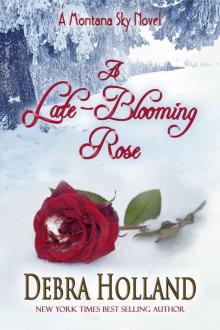 A Late-Blooming Rose: A Montana Sky Series Novel
A Late-Blooming Rose: A Montana Sky Series Novel Mystic Montana Sky (The Montana Sky Series Book 6)
Mystic Montana Sky (The Montana Sky Series Book 6) Harvest of Dreams (The Gods' Dream Trilogy)
Harvest of Dreams (The Gods' Dream Trilogy) Healing Montana Sky
Healing Montana Sky Beneath Montana's Sky: A Montana Sky Novella (The Montana Sky Series Book 0)
Beneath Montana's Sky: A Montana Sky Novella (The Montana Sky Series Book 0) Wild Montana Sky (The Montana Sky Series)
Wild Montana Sky (The Montana Sky Series)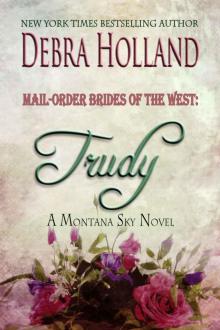 Mail-Order Brides of the West: Trudy (A Montana Sky Series Novel)
Mail-Order Brides of the West: Trudy (A Montana Sky Series Novel) Sower of Dreams (The Gods' Dream Trilogy)
Sower of Dreams (The Gods' Dream Trilogy)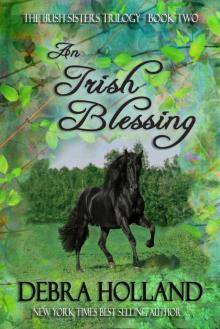 An Irish Blessing: The Irish Sisters Trilogy (Montana Sky Series)
An Irish Blessing: The Irish Sisters Trilogy (Montana Sky Series)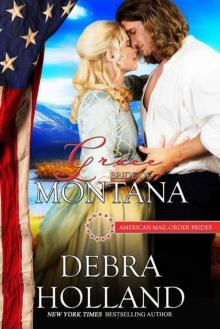 Grace: Bride of Montana (American Mail-Order Bride 41)
Grace: Bride of Montana (American Mail-Order Bride 41) Glorious Montana Sky (The Montana Sky Series)
Glorious Montana Sky (The Montana Sky Series) Montana Sky Christmas: A Sweetwater Springs Short Story Collection
Montana Sky Christmas: A Sweetwater Springs Short Story Collection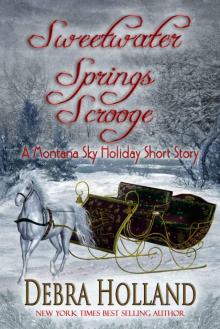 Sweetwater Springs Scrooge: A Montana Sky Holiday Short Story (The Montana Sky Series)
Sweetwater Springs Scrooge: A Montana Sky Holiday Short Story (The Montana Sky Series) MONTANA SKY 07.5: Angel In Paradise
MONTANA SKY 07.5: Angel In Paradise Singing Montana Sky (The Montana Sky Series Book 7)
Singing Montana Sky (The Montana Sky Series Book 7) Painted Montana Sky: A Montana Sky Series Novella
Painted Montana Sky: A Montana Sky Series Novella Reaper of Dreams (The Gods' Dream Trilogy)
Reaper of Dreams (The Gods' Dream Trilogy) A Valentine's Choice: A Montana Sky Series Holiday Novella (The Montana Sky Series)
A Valentine's Choice: A Montana Sky Series Holiday Novella (The Montana Sky Series)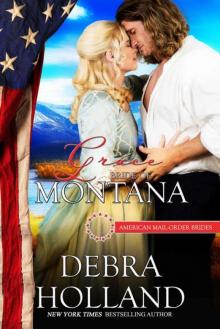 Grace_Bride of Montana
Grace_Bride of Montana Mail-Order Brides of the West: Bertha: A Montana Sky Novella (Montana Sky Series)
Mail-Order Brides of the West: Bertha: A Montana Sky Novella (Montana Sky Series)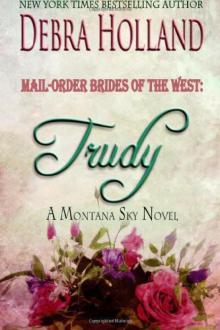 Trudy
Trudy